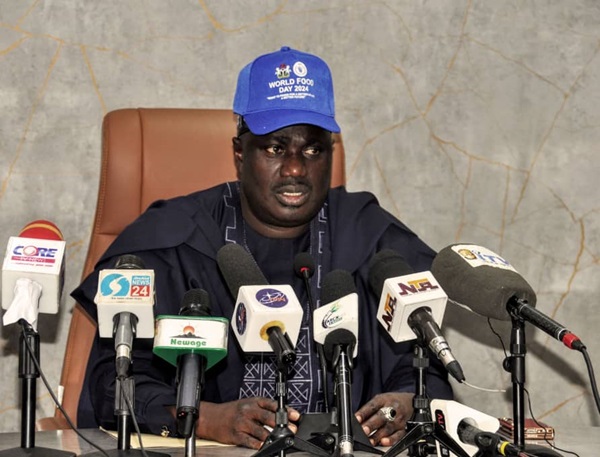
As Nigeria joins the rest of the world in commemorating the 2024 World Food Day, the Federal Government has pledged to intensify efforts in combating hunger across the country.
The Minister of State for Agriculture and Food Security, Sen. Aliyu Abdullahi, made this commitment during a ministerial briefing to mark the occasion, themed “The Right to Food for a Better Life and a Better Future.”
Highlighting the progress made in the agricultural sector, the minister noted that significant achievements have been recorded due to the Federal Government’s policy initiatives and innovative funding mechanisms. In 2017, Nigeria ranked first globally in cassava and yam production with outputs of 59.4 million tonnes and 47.9 million tonnes, respectively. That same year, Nigeria ranked 14th in maize production with 10.42 million tons and 4th in palm oil production with 7.7 million tonnes.
In 2019, Nigeria became the largest producer of rice in Africa, with a production level of 9 million metric tonness. According to Abdullahi, this is a testament to the government’s dedication to boosting agriculture and ensuring food sufficiency for the country’s growing population.
Building on these successes, the current administration under President Bola Tinubu, has prioritised food security as part of its ‘Renewed Hope’ agenda. “The administration is implementing a series of policies and initiatives aimed at ensuring the right to food for a better life and future in Nigeria,” the minister stated.
To address rising food prices, Abdullahi announced the immediate release of over 102,000 metric tonnes of maize, millet, garri and other food commodities from the National Food Reserve. As an interim measure, the government has also resorted to importing food commodities to augment shortages.
In his national broadcast during Nigeria’s 64th Independence Anniversary, Tinubu reaffirmed the government’s commitment to reducing food costs and increasing agricultural output. The administration is prioritising mechanised farming, which is expected to accelerate food production and drive economic growth.
As part of its strategy to enhance food security, the government plans to cultivate 500,000 hectares of farmland across the country to grow maize, rice, wheat, millet and other staple crops. This initiative is expected to boost food supply, lower prices, and promote agricultural sustainability.
The minister also highlighted the government’s focus on improving economic opportunities for small and marginal farmers, women and youth. These efforts aim to create jobs, reduce poverty and drive inclusive economic growth.
“The present administration is committed to developing the agricultural sector to achieve the Sustainable Development Goals (SDGs), particularly zero hunger and improved rural productivity,” Abdullahi said. He stressed that agriculture remains a powerful tool for fighting hunger, poverty, and unemployment, and reaffirmed the government’s commitment to addressing these challenges.
In his remarks, the assistant country representative of the Food and Agriculture Organisation (FAO), Salisu Mohammed raised concerns about food insecurity in Nigeria. The March 2024 Cadre Harmonisé projected that 31.8 million people in the country are at risk of food insecurity. He added that recent floods had further exacerbated the situation, with an estimated food loss of 855,629 metric tonnes—enough to feed 8.5 million people for six months.
Mohammed called for collaborative efforts to find solutions to Nigeria’s food security challenges and urged the Ministry of Agriculture to create an enabling environment for food production.
Also speaking, the national president of the All Farmers Association of Nigeria (AFAN), Kabiru Ibrahim urged the government to provide incentives and support for farmers to increase food production and feed the nation.
As part of the World Food Day celebrations, officials from the Ministry of Agriculture visited farm clusters in Bwari Area Council and Government Girl Secondary School in Dutse. A sensitisation road walk was also held to raise awareness about food security, according to a statement by the ministry’s director of information, Mrs. Anthonia Eremah.


